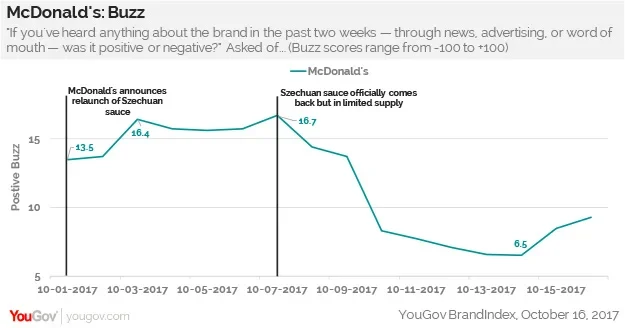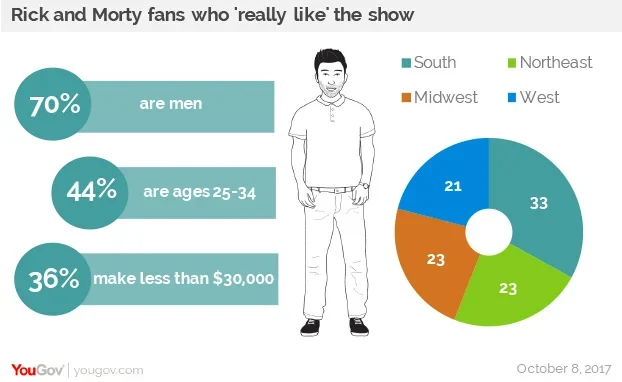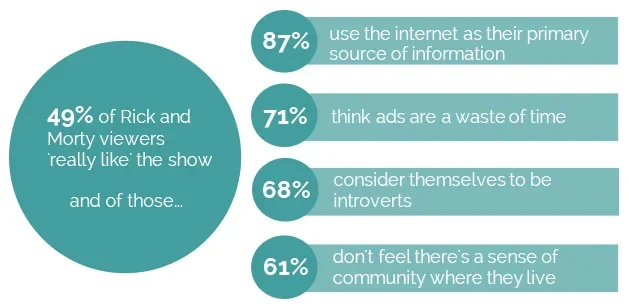McDonald’s may have missed its mark, but it also identified a passionate new consumer segment
An internet firestorm was sparked recently by a combination of the most famous quick-service restaurant in the world, a cult following of a cartoon show, and a lack of chicken nugget sauce. When McDonald’s announced on October 1 that it would bring back its 1998 Szechuan sauce for a single day in a nod to viewers of the Adult Swim show Rick and Morty, it seemed like an inspired call. But YouGov data shows that the quick-service giant bit off more than it could chew given the diehard nature of Rick and Morty fans.
YouGov BrandIndex data shows that the company’s positive Buzz score spiked after the announcement of the sauce until October 7th, the day sauce actually relaunched. A Buzz score measures consumer perception by asking respondents, "If you've heard anything about the brand in the past two weeks – through news, advertising, or word of mouth – was it positive or negative?" A score can range from -100 to 100, with a zero score equaling a neutral position.

Fans lined up for hours before lunch for the sauce; in some locations, only twenty sauce packets were available. When many fans realized they wouldn’t be getting their hands on any sauce, they quickly took to social media to vent their anger. A dip in McDonald’s Buzz score followed over the few days.
When one brand hopes to adopt another brand’s fans, even for a day, it’s important to get into the mindset of those consumers. YouGov Profiles data reveals that most Rick and Morty fans weren’t big on McDonald’s to start – in fact, Rick and Morty viewers are 17 percentage points less likely to “like” the chain than the general public (22% to 39%).
The data also shows that twice as many Rick and Morty fans “really like” the show compared to those who said they just “like” it. Understanding its cult-like status means knowing that it thrives in the corners of online communities. The show has over a million Twitter followers and currently stands as the 75th most active subreddit.

People who “really like” Rick and Morty are predominantly older male millennials. Of this group, 87% of them use the internet as their primary source of information, 68% consider themselves to be introverts, and 61% don’t feel there’s a sense of community where they live. The data suggests that this group of Rick and Morty diehards are not just tight knit, they may also find refuge on the internet and in their fellow Rick and Morty viewers. All of this may have contributed to the fanbase’s strong online reaction to McDonald’s marketing scheme.

But McDonald’s adapted quickly and took the online reactions in stride, responding to disgruntled fans with Rick and Morty quips and inside jokes. As YouGov’s recent analysis on the mindset of an American boycotter suggests, rectifying the situation involves clear messaging that gets ahead of the press, confronts the issue, and as that memory subsides, forms a more positive perspective. That’s what exactly what McDonald’s did in vowing to bring back Szechuan sauce – not only for a day, but until all Rick and Morty fans are satisfied.
Read more results from this poll here
Find out more about YouGov's BrandIndex and Profiles research products
Image: Adult Swim










